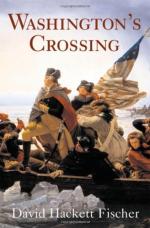
|
| Name: _________________________ | Period: ___________________ |
This test consists of 15 multiple choice questions and 5 short answer questions.
Multiple Choice Questions
1. Due to their delay from bad weather, George Washington puts their attack time at about what hour?
(a) 7 a.m.
(b) 9 a.m.
(c) 11 a.m.
(d) Noon.
2. The original plans are to cross the Delaware River under what circumstances?
(a) Under cover of darkness and attack a little before dawn.
(b) At dawn and attack with adequate daylight.
(c) Under cover of darkness and attack a little after dawn.
(d) Under cover of darkness and attack at dawn.
3. Although the Hessians prepare in every other way possible against an attack, what factor plays a crucial role in the events the author details in the chapter he calls "The Surprise?"
(a) The size of the American army.
(b) The speed of the attack.
(c) The time of the attack.
(d) The weather.
4. At the conclusion of the chapter entitled "The Surprise," the author notes the Hessians are simply tired by the end of the day, and the Americans are far too driven to accept another defeat for what reason?
(a) The Americans are fighting for their freedom.
(b) The Americans have lost too much already.
(c) The Americans are led by George Washington.
(d) The Americans are tired of losing.
5. Charles Cornwallis' soldiers outnumber George Washington's rebels by what ratio?
(a) 4:1.
(b) 3:1.
(c) 2:1.
(d) 5:1.
6. While the location the Americans select is their own ground, it is not what?
(a) Easily defendable.
(b) Easily assaulted.
(c) Easily located.
(d) Easily overrun.
7. From a military perspective, what is George Washington concerned about in the attack at Trenton?
(a) His troops are soaking wet, cold, and slow.
(b) A large loss of supplies and weapons in the crossing.
(c) The element of surprise has been lost.
(d) His troops are in poor spirits.
8. The American destination in reference to the title of the book is originally what?
(a) Tuckahoe.
(b) Princeton.
(c) Known only to the officers.
(d) Kept secret.
9. What view proves to be a mistake of historical consequence on the part of the Hessians in the pivotal battle at Trenton?
(a) They can not gather the defense needed to fight off the rebels.
(b) They can not gather the offense needed to fight off the rebels.
(c) They are severely outnumbered.
(d) The rebel units are more extensively trained than the Hessians.
10. When do the American troops prepare to cross the Delaware River and invade Trenton?
(a) St. Nicholas Day.
(b) Christmas Eve.
(c) Christmas Day.
(d) New Year's Eve.
11. What is George Washington's only order to his men throughout their march?
(a) Move faster.
(b) Hold steady.
(c) Press on.
(d) Maintain courage.
12. Charles Cornwallis is in denial over the growing rebel troop strength, and, acting on his experience, what does he feel is the best course to take?
(a) A staggering approach is the best course against a weak opponent.
(b) A moderate stroke is the best course against a weak opponent.
(c) A strong stroke is the best course against a weak opponent.
(d) A strong defene is the best course against a weak opponent.
13. The title of this chapter, "The Bridge," refers to one crossing over which waterway?
(a) Delaware Creek.
(b) Pebble Creek.
(c) Assunpink Creek.
(d) Matawan Creek.
14. In "Hard Choices," who urges George Washington to push the enemy from the state?
(a) General Nathanael Greene.
(b) Alexander Hamilton.
(c) Benjamin Franklin.
(d) John Cadwalader.
15. According to the author, of what are the Americans in awe regarding their opponents in combat?
(a) Their opponents' marching, artillery training, and determination.
(b) Their opponents' timeliness, skill, and never fleeing.
(c) Their opponents' discipline, marching, and marksmanship.
(d) Their opponents' discipline, skill, and sheer effrontery.
Short Answer Questions
1. How do Cornwallis' troops come to feel in comparison with their commanders?
2. As the Americans assemble and pursue their march toward Trenton, what course does the stormy weather take?
3. How many of the Americans' artillery pieces are lost in George Washington's Delaware River crossing?
4. In addition to tired troops and inclement weather, the author notes in "Hard Choices" that George Washington also has to face what problem?
5. How does the artillery affect the mobility of the American army during their march toward Trenton?
|
This section contains 753 words (approx. 3 pages at 300 words per page) |

|




